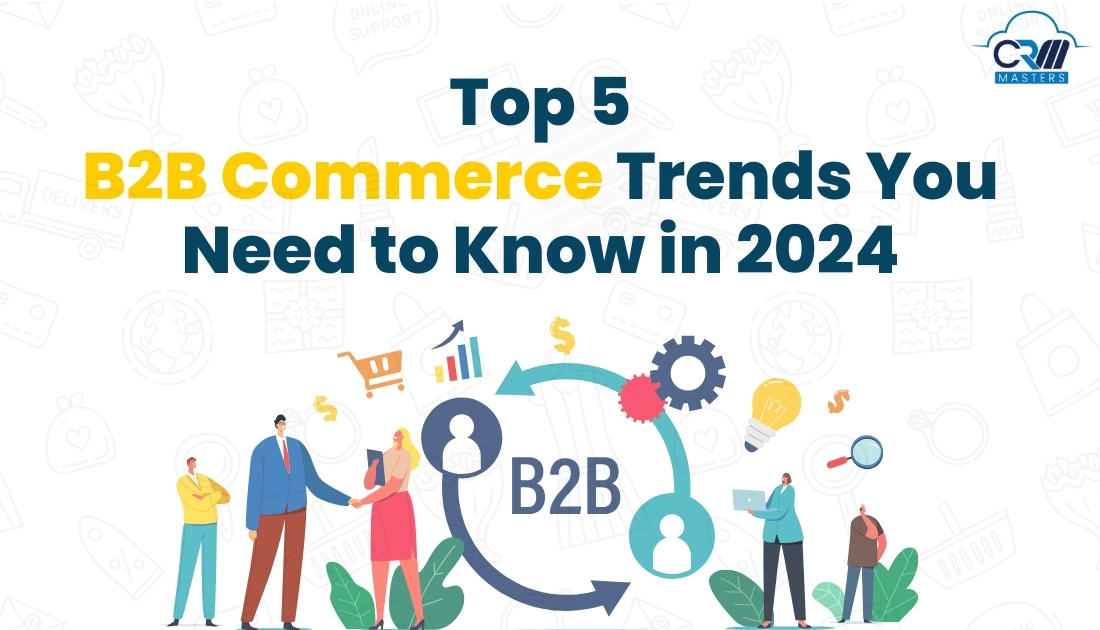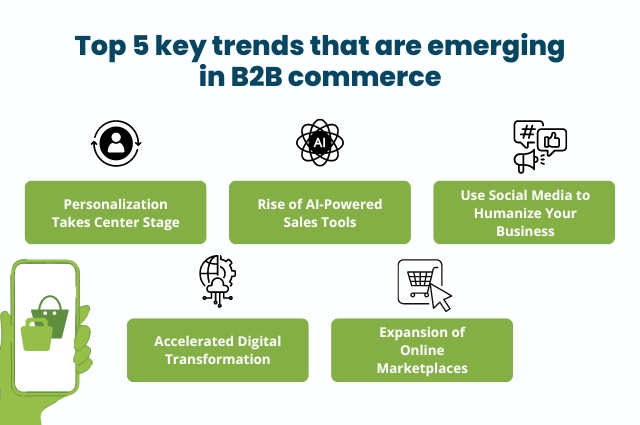
Top 5 B2B Commerce Trends You Need to Know in 2024
Staying ahead of the curve is essential for companies to remain competitive in business-to-business (B2B) commerce and witness a rapid evolution driven by technical innovations, shifting consumer behaviors, and global market trends. To remain competitive and drive growth, companies must keep up with emerging trends.
Our blog explores the top 5 transformative trends transforming B2B commerce, offering organizations insights and strategies for thriving in this ever-evolving environment.
From the growing emphasis on personalization and the rise of AI-powered sales tools to the integration of sustainability practices and the expansion of online marketplaces, these trends are revolutionizing the way businesses operate and interact in the digital age.
Let’s find out some of the top trends in B2B commerce and discover how companies can leverage these to grab new opportunities and stay ahead of the curve in 2024.
What is B2B Commerce?
B2B commerce, or business-to-business commerce, refers to dealings of buying and selling between businesses, where products or services are traded through online channels. B2B commerce trade uses multiple online channels like websites, online marketplaces, and other digital sources.
Unlike B2C transactions, which involve selling goods or services directly to end consumers, B2B transactions cater to the needs of other businesses, such as manufacturers, wholesalers, retailers, or service providers.
This industry is rapidly growing and constantly transforming the way businesses interact with other businesses. B2B commerce enables streamlined business operations such as sales processes, reduced overhead costs, and enhanced & improved efficiency by automation in business tasks.
Key Components of B2B Commerce
Direct-To-Business (D2B) –
Businesses use their own online storefront to sell their goods or services to other businesses directly.
Marketplaces –
B2B marketplaces like Alibaba or Amazon Business provide a convenient platform for businesses to buy and sell products and services.
Procurement –
In B2B eCommerce, procurement involves using online platforms to streamline purchasing processes. With B2B procurement software, businesses automate tasks like purchase orders and supplier management, enhancing efficiency and reducing manual labor.
e-Procurement –
Similar to B2B procurement, e-procurement utilizes online platforms to manage purchasing. These systems, more advanced and integrated with other business tools like inventory management, enhance efficiency further by automating tasks such as invoice processing.
B2B2C –
B2B2C entails businesses partnering with others to sell directly to consumers. An online store owned by a retailer may be used by a clothing manufacturer to sell products directly to consumers.
Wholesale Businesses –
Wholesale businesses act as intermediaries between manufacturers and retailers, buying products in bulk and selling them at a markup. This model requires significant capital for inventory purchase upfront and benefits from negotiation skills.
Manufacturer Businesses –
Manufacturers produce goods sold to other businesses for onward distribution to consumers. While rewarding, this model demands substantial resources, including production facilities and skilled labor.
Distributor Businesses –
Distributors serve as middlemen between manufacturers and retailers, buying and reselling products without ownership. Ideal for those avoiding manufacturing complexities, distributor businesses still play a vital role in the supply chain.
Top 5 Key Trends That Are Emerging in B2B Commerce

1. Personalization Takes Center Stage
In 2024, personalization continues to be a driving force in B2B commerce. Just as customers expect customized experiences in their B2C transactions, businesses now demand personalized interactions in their B2B dealings. With advancements in data analytics and AI-driven technologies, companies can gather and analyze vast amounts of data to understand their clients’ preferences, behaviors, and needs better.
Personalization extends beyond product recommendations; it encompasses every touchpoint in the buyer’s journey. From personalized pricing and promotions to customized marketing messages and streamlined purchasing processes, B2B sellers are utilizing personalization to deepen client relationships and enhance overall satisfaction.
For example, leading B2B e-commerce platforms are employing machine learning algorithms to deliver personalized product recommendations based on past purchases, industry trends, and individual customer preferences. This level of personalization not only improves the customer experience but also boosts sales and helps in building long-term loyalty.
2. Rise of AI-Powered Sales Tools
AI in B2B commerce has been used for sales forecasting. By analyzing historical sales data, market trends, and other relevant factors, AI algorithms can generate accurate sales forecasts, helping businesses predict demand, optimize inventory levels, and allocate resources more efficiently.
Moreover, AI-driven chatbots are transforming customer service in B2B e-commerce. These intelligent bots can handle routine inquiries, provide product information, assist with order tracking, and even facilitate transactions, all in real-time. By leveraging AI chatbots, B2B sellers can deliver 24/7 support, improve response times, and enhance overall customer satisfaction.
3. Use Social media to Humanize Your Business
Social media is a powerful tool in this digital world for humanizing your B2B brand. Through social media channels like Facebook, Instagram, WhatsApp, etc B2B brands can connect with their customers in a more personal manner and can communicate with them directly to make their impact more powerful.
Brands can also use social media to build loyalty among their customer by sharing stories and showcasing their company culture, their core values, and missions. This medium helps businesses create a strong connection with their prospects and allows them to relate with the brand in a more humanized manner.
4. Accelerated Digital Transformation
One area witnessing rapid digital transformation in B2B commerce is the adoption of cloud-based e-commerce platforms. These platforms offer scalability, flexibility, and accessibility, allowing businesses to create seamless online experiences for their customers while streamlining internal operations.
Here are a few more points to show, how businesses are using digital transformation to increase sales:
- Enhanced Customer Experience: From intuitive website navigation to personalized product recommendations, digital tools enable businesses to cater to individual customer needs and preferences. By prioritizing user experience, businesses can increase customer satisfaction and loyalty, ultimately driving sales and revenue.
- Improved Marketing Strategies: This enables them to create highly targeted marketing campaigns that resonate with their target audience, leading to higher conversion rates and increased sales.
- Streamlined Sales Processes: Through the implementation of customer relationship management (CRM) systems and sales automation tools, businesses can manage leads more effectively, and track sales pipelines. This increased efficiency in sales processes results in shorter sales cycles and higher conversion rates, ultimately driving sales growth.
5. Expansion of Online Marketplaces
Online marketplaces are becoming essential channels for B2B transactions in 2024. These digital platforms connect buyers and sellers from around the globe, offering a wide range of products, services, and suppliers in one centralized location.
B2B marketplaces provide multiple benefits, including increased visibility, access to a larger customer base, and simplified procurement processes. Buyers can easily compare products, evaluate suppliers, and make purchases online, while sellers can reach new markets and expand their customer reach without significant upfront investment.
Moreover, B2B marketplaces are evolving into ecosystems that offer value-added services such as financing options, logistics support, and integration with enterprise systems.
CRM Master’s Infotech Helps You Set Up Online Sales Fronts for Your Brand!
We are a leading Shopify e-commerce development partner, offering scalable, all-inclusive, and responsive e-commerce solutions to help you stand out in the always-changing e-commerce market.
CRM Masters has certified Shopify Developers to provide businesses with scalable responsive eCommerce solutions. By creating easy-to-use online stores, we help you increase your bottom line through custom-tailored services.













